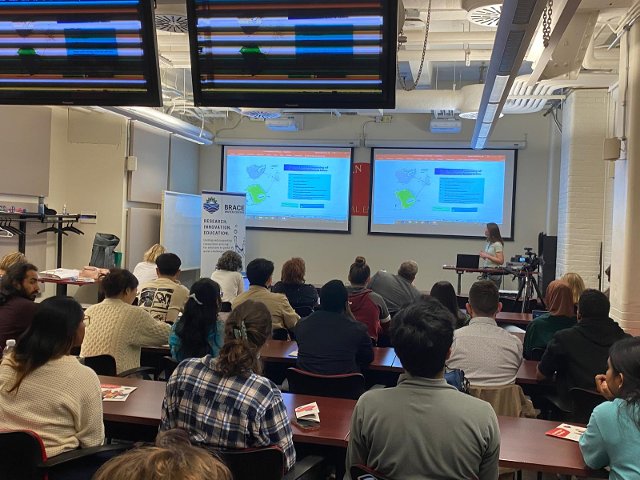
Developing Water Quality Cooperation with Canada
21.06.2024 / 01:07 | Aktualizováno: 21.06.2024 / 01:13
During the week of June 10, 2024, researchers from the Czech Republic visited Canada to share their knowledge and experience in the areas of wastewater treatment, water quality and water sanitation. The 2030 Agenda project was implemented with the support of the Ministry of Foreign Affairs with the aim of deepening cooperation in the area of UN Sustainable Development Goal 6. Coordinated by the Embassy of the Czech Republic in Ottawa and the Consulate General of the Czech Republic in Toronto, the visit included programs in Montreal and Winnipeg at McGill University and the University of Manitoba.
As a country with access to the Great Lakes, the Arctic, the Pacific and the Atlantic Ocean, Canada has traditionally been heavily committed to water research. The country places a major emphasis on sustainability, including through water management and contaminant monitoring and, more recently, supporting Indigenous peoples whose communities often face limited access to clean, potable water. This is why Sustainable Development Goal 6, focusing on access to and sustainable management of water and sanitation, is also a priority, with the University of Manitoba being the designated research hub for this goal. Given the extensive expertise of Czech research organizations in the areas of research related to water quality monitoring, treatment and management, a project was organized that allowed for the transfer of knowledge and experience between Canadian Universities, the T.G. Masaryk Water Research Institute and the University of South Bohemia in České Budějovice through the visit of researchers from both institutions.
The program in Montreal was hosted by the Brace Water Centre at McGill University, one of the top-ranked universities in Canada. The Brace Water Centre is an inter-disciplinary research centre focused on studying and developing solutions for water management and sanitation challenges, with 110 research projects and funding of 43 million Canadian dollars. It focuses on climate change, water resource management, irrigation, wastewater treatment, water in relation to human health, environmental quality and energy. The Czech researchers' presented the work of their respective institutions and their own research on water quality, wastewater and toxicity, which allowed them to share information about Czech research projects and key institutions, as well as to seek opportunities for collaboration with Canadian counterparts. The lectures outlined research on pathogens in water, monitoring of microbial populations (including COVID-19), antimicrobial resistance, the release of toxins into water and other related topics. The researchers also visited local laboratories and interacted with selected professors and students to learn about their ongoing research and practices.
The Czech experts also visited the province of Manitoba, one of the Prairie Provinces that has faced abnormal drought and dryness in recent years thus adding to the importance of sustainable water management. The program of the visit was arranged by the University of Manitoba, a leading university in the field of agricultural, environmental and water research, which is the designated SDG 6 Hub in North America. The university is also currently in the process of establishing a new institute for water research, with which there will be opportunities for further collaboration in the coming months. The visit in Manitoba also included lectures from the Czech researchers and a roundtable with researchers from the University of Manitoba focusing on SDG 6, in addition to visits to microbiology, engineering, food technology and soil quality laboratories used in water sanitation and sustainability studies. The Czech delegation also visited a water treatment plant that provides services to approximately 400,000 individuals living in Winnipeg, the province’s capital, and where the University of Manitoba conducts its research into water management and sustainability.
During the visit, the researchers shared their findings and discussed opportunities for collaboration, including through student and researcher mobility and possibly joint research projects. In particular, Canada's participation in Horizon Europe is an opportunity to establish a joint consortium for a research project focusing on wastewater and human health. Another interesting opportunity may be to link the University of Manitoba's research on the history of water management and access of indigenous peoples and to compare it with the history of water management and access in Central Europe, which has an extensive history of aquaculture. Representatives from the Brace Centre at McGill University also appreciated the presentations and meetings with Czech researchers, especially in the field of environmental biotechnology and wastewater management where they see great potential for future cooperation with Czech researchers. In this context, they discussed the possible use of programs administered by the federal grant agency NSERC (Natural Sciences and Engineering Research Council of Canada) under Alliance Grants, which support collaboration in research and development between Canadian university researchers and their international counterparts.
The project will be followed up by the Consulate General of the Czech Republic in Toronto and the Embassy of the Czech Republic in Ottawa through the preparation of a potential visit of Canadian experts to the Czech Republic to facilitate research cooperation. Efforts will also be undertaken to establish and expand opportunities for the application of water treatment and management solutions developed by Czech companies in Canada.
Jan Kubačka, Embassy in Ottawa and Eva Libs Bartoňová, Consulate General in Toronto






